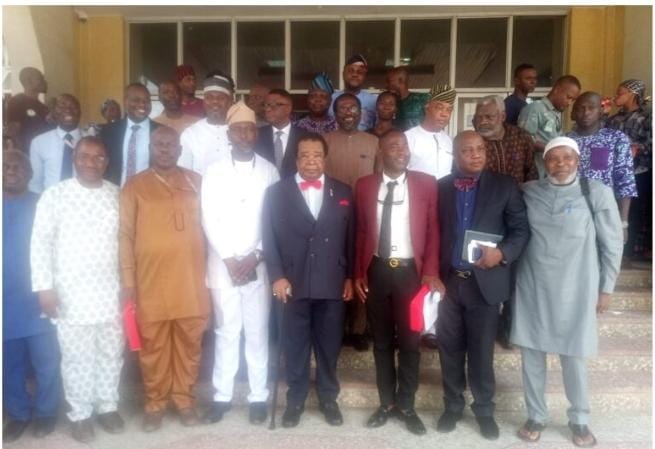The history department is an embodiment of strategy, which, according to Professor Oluwatoki, “is an instrument of policy just as war is a means to achieving political objectives.” Inarguably, education is expensive everywhere in the world, especially university education. What is common in universities is paying tuition fees, bills and dues.
Academic conferences, webinars, seminars, and several orientation programmes are important to the development of an institution. They are important means of creating awareness about the university. Thus, you find universities, like Lagos State University, holding academic programmes while inviting dignitaries and academic juggernauts. At the faculty and departmental levels, several programmes were held at LASU, covering a wide range of topics essential for national development.
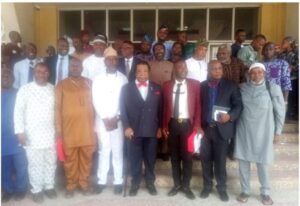
One of the foundation departments of Lagos State University is the Department of History and International Studies. The department is inarguably the face of the prestigious Faculty of Arts. Its lecturers are indefatigable, academically. History students are best in times of academics, politics, sports, and other social activities. They, however, find some of the department’s programmes irrelevant. Not at undergraduate level. On the other hand, our lecturers have a way of getting things done. They know how to compel their students to make their wishes come true. Here is an appreciation of some strategies employed by the history department over time.
To start with, some students have not realised that university education is expensive. Many students believe that Nigeria is running a free education system, even though that is not deniable. Therefore, students find it difficult to pay the prodigious tuition fee and unholy faculty and departmental dues. One of the dues you cannot escape as a history student at LASU, is exam dues. Much cheaper than the journal dues you pay almost annually. These dues are burdensome, and some students—being Nigerians—want to bypass them. This is why the department is so strategic. It attaches dues to critical things such that it becomes impossible to write exams without fulfilling payments. Receipts are attached to course registration, which is inevitable for examination dockets. Hence, you cannot access the exam hall without the docket. The department is, however, to be appreciated for abiding by the school rules and regulations. It does not compel its students to buying course handouts and materials. Materials are available in the school library.
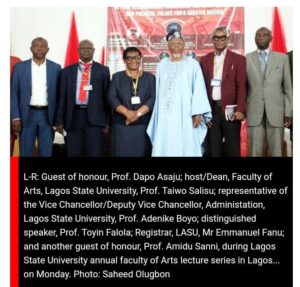
The second and most important aspect of this piece is intended to appreciate the intellectual programmes held at the department. Empirical research reveals that most of the lecture series in the Faculty of Arts between 2022 (when I became a student) and 2024 were held by the Department of History and International Studies under the aegis of the university. Distinguished among these lectures was the august appearance of an academic giant, Professor Toyin Falola, first, on August 10, 2022, when he delivered a lecture titled: “History and the Nation” (48-page essay). He delivered another interesting lecture in October 2023, entitled “Beyond Sectarianism: Harnessing the Socio-Religious and Political Values for a Greater Nigeria.”. Here is my review of the lecture. “A Review of Toyin Falola’s Beyond Sectarianism: Harnessing the Socio-religious and Political Values for a Greater Nigeria” https://heartofarts.org/a-review-of-toyin-falolas-beyond-sectarianism-harnessing-the-socio-religious-and-political-values-for-a-greater-nigeria/
The department invited one Nigerian Army General in 2022 to deliver a lecture—I remembered him debunking merging of history and international relations as a course. It also hosted, in January 2023, the Great Professor Bolaji Akinyemi, former Director-General of the Nigerian Institute of International Affairs (NIIA) and foreign minister. He delivered a lecture on the Russian-Ukraine War entitled, “Competing narratives on the Russian-Ukraine war’’. Not to mention the discussions on the Israeli-Gaza War held on October 26, 2023. Apparently, conferences and webinars are meant for human beings, for the students in the department. These activities are burdensome for history students. There is no time. Hours of classroom lectures are enough to achieve brilliance, many believed. Thus, it takes the department’s carrot-and-stick approach to get its students in attendance. My fourth year as a student in the department has given me much appreciation for the topic.
One of the strategies to be noted is the compulsion for written attendance. Students are told to attend programmes whose attendance would represent the continuous assessment (C.A.) for some courses done for that semester. Failure to attend the programme, lecturers claim, would deprive students of much of their CA. Another strategy of note is asking students to submit assignments at programmes. Students are told beforehand that such an assignment takes the bulk of their continuous assessment. Therefore, ambitious students would not want to miss out on such opportunity. I remembered how I regretted failing to submit one of such assignments despite attending the so-called programme. I had to run to the lecturer’s office to lodge my complaints. Surprisingly, however, some students did not attend these programmes, yet, they got away with it. The reason cannot be far-fetched. Students have realised the “authenticity” of the threats that the department issues. One of my engagements with Dr Dapo Thomas has made me realise that, even in international politics, no state issues empty threat—threat it cannot enforce—without losing its credibility. Everyone is now wise! (Not even the Gen Z).
Yet, an outlandish strategy was employed recently to compel the students to attend the 95th Inaugural Lecture delivered by one of our distinguished retiring lecturers, a professor of social history, Professor Ezekiel O. Adeoti, on the 16th of April. We were supposed to have one uncommon form of exam that would require us to abandon (the whole) Faculty of Arts for Education. The unorthodox exam would also ensure that students across all levels in the department are seated in a 3-in-1 examination hall at the Faculty of Education. Innocent students, like me, could not have imagined the rationale behind such convergence—perhaps because I had not gotten any notification regarding the programme slated to hold for that afternoon. While we were seated in the hall, I was hearing students of the lower levels say there were no exams to be conducted. I didn’t want to listen to such rumours. So, I continued revising what I had read, while adjusting my ID card and straightening my docket. Shortly, Mr. Femi, a lecturer in the department, came and ordered that the 400-level students follow him to the main auditorium, Buba Marwa. It was then that I realised what was going on. It was heartbreak! But my writing materials were no longer with me for jotting’s sake. However, those who would not attend the programme still, refused to do so—those who understood more than I didn’t even bother leaving their hostel.
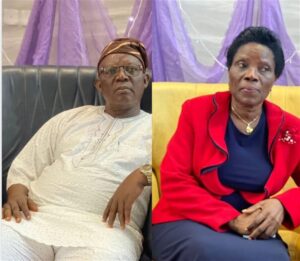
The newly retired professors
While I was contemplating the strategy that the department had employed this time, which I felt there was no need for, one of the department’s football strikers, Ibrahim Chado, was quick to remind me, “no be every student be like you.” I would have attended the lecture willingly. Before the reader imagines my personality as a “rich kid” because of my position on the dues and other payments made to the department (and the university as a whole), I beg to present myself as one little boy of the third class. Obviously, a bookworm would not be writing such an article during the examination period. I’m not a bookworm. I get joy! However, this article is to educate my fellow coursemates and students that there are values in attending university programmes, especially those insightful yet entertaining programmes held by the LASU Department of History and International Studies. Attending departmental lectures would help us become familiar with authorities in our field of study. We get to appreciate contemporary and trending issues at the national level and on the world stage.
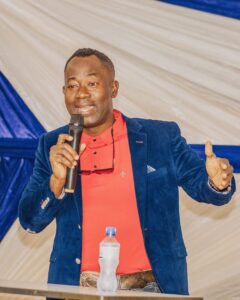
Prof Falode, the Head of History Department, LASU
I acknowledge the LASU Department of History and International Studies for all the wonderful and impactful lectures delivered so far, especially under the leadership of Professor Adewunmi Falode. The April 16th experience exemplifies one of his teachings on war. Professor Falode has reiterated the importance of “initiative” and “timing” among the principles of war. No doubt, it could only have been that strategy that brought the “busy students” to attend the inaugural lecture. It is not in my position to plead with the department for a reduction in dues. Ilu le! I understand, however, that the department needs funding for survival. If the department must continue with a carrot-and-stick approach, it will be encouraging if rewards reflect on students’ performance. We wish for more lecture series going forward.
Abdulkabir Muhammed is in the Department of History and International Studies at Lagos State University.
